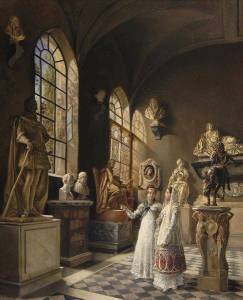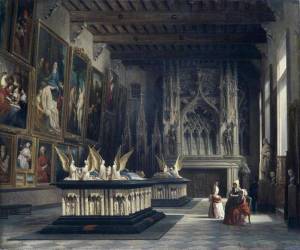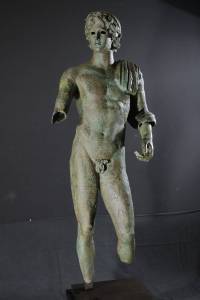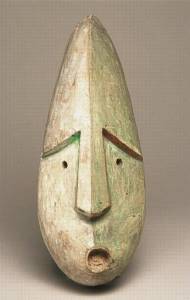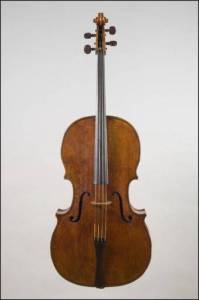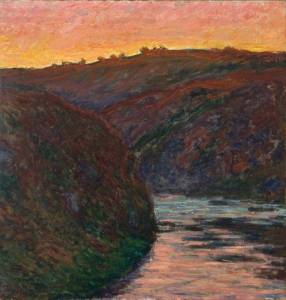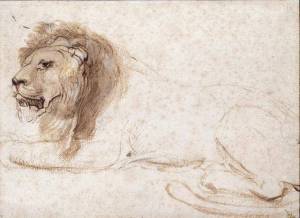The network of museums in France
The network of 1,216 museums in France (November 2022 figure) has been built up gradually since the end of the eighteenth century.
Nineteenth century: birth of museums
The first museums appeared at the end of the eighteenth century, in Paris and in most of the major cities of France (Bordeaux, Caen, Lille, Rennes, Rouen, Toulouse...). They have an educational vocation. Their collections are constituted in particular from revolutionary seizures or state deposits. During the first half of the nineteenth century, most significant cities opened a museum, usually on the initiative of municipalities, and often thanks to the generosity of donors. This movement intensified in the second half of the century. Societies like «friends of the arts» then play an important role in the organization of exhibitions and the enrichment of collections. The policy of state deposits is also very important.
Twentieth century: three types of institutions
Until 1945, regional museums were placed under the ill-defined control of a provincial museum inspection. The thirty state-owned museums are managed by the Ministry of National Education, in a general direction of Fine Arts.
On release, the ordinance of 13 July of the Provisional Government of the French Republic classified museums into three types of institutions:
- National museums (about 30)
- classified museums (a dozen major regional museums);
- controlled museums.
In 1991, the decree of 5 August redefined and extended the scope of intervention of the Directorate of Museums of France (DMF), which was then in charge of «proposing and implementing the State’s policy on museographic heritage» and «to organize the cooperation of the various public authorities in this field».
The reorganization of the DMF, now Service des musées de France (SMF), between 1990 and 1994, put an end to the distinction of treatment between classified and controlled museums and thus allowed a general competence on all museums.
The law museums of France: a decentralizing text
The museum law of 2002 completed this movement of emancipation of communities. This law is above all a decentralizing text, which aims to respect the freedom of organization and the freedom of choice of legal persons who own museum collections. It specifies for the first time the «rule of the game» applicable to the relations between the State and the territorial collectivities and limits, for the future, the technical control of the State to the only museums that their owners will have wished to submit to the statute provided for by the law.
Advisers for museums, present in each Regional Directorate of Cultural Affairs (DRAC), are responsible for implementing the national policy on museums: examination of applications for the name museums of France, files for withdrawal of the name, renovation or museum construction projects etc.
Formation d'un réseau de musées de France
Il s’est ainsi formé un réseau de musées de France, constitué des musées nationaux, musées placés pour la plupart sous la tutelle administrative du Service des Musées de France et du ministère de la culture, et des musées de collectivités ou de personnes morales.
Musées de collectivités
Les musées de collectivités territoriales sont, et de loin, les plus nombreux puisqu'ils représentent à eux seuls 82% des musées de France.
Remarkable collections
Created, for the first, from the end of the eighteenth century, they are today more than a thousand. Their collections are estimated at nearly 41 million objects, the variety of which is astonishing. The scientific interest of these collections is extremely important, both by the diversity of origins as well as by the originality or rarity of some objects themselves. Not a single museum in France, even among the most modest, which does not keep its «Mona Lisa»: Ephèbe d'Agde, Eve d'Autun... these masterpieces are so numerous that it is impossible to list them.
Museums of international stature
Many of these museums have an international reputation, especially when they testify to a moment of history (museum of the Compagnie des Indes in Lorient, the Great War in Meaux, memorial of Caen, a museum for peace…). The very nature of the collections can justify this international aura. For example, the Auch Museum is internationally known for its collection of feathers of pre-Columbian origin, the Boulogne-sur-Mer Museum for its Alutiiq masks from Alaska…
Monographic museums
Museums devoted to personalities are numerous, whether people of letters, very present (museums Balzac in Paris, Barbey d'Aurevilly in Saint-Sauveur-le-Vicomte, Corneille and Flaubert in Rouen, Dumas Père in Villers-Cotterets, Victor Hugo in Paris and Villequier, La Fontaine in Château-Thierry, Mallarmé in Vulaines-sur-Seine, Rimbaud in Charleville-Mézières, Romain Rolland in Clamecy, Edmond Rostand in Cambo-les-Bains, Rousseau in Montmorency, George Sand in Nohant…), musicians (Saint-Saëns in Dieppe, Berlioz in La Côte-Saint-André), artists (Eugène Boudin in Honfleur, Camille Claudel in Nogent-sur-Seine, Ingres in Montauban, Lalique in Wingen-sur-Moder, Matisse in Cateau-Cambrésis and in Nice, Toulouse-Lautrec in Albi…), political figures (Jaurès in Castres, Louis-Philippe in Eu...) or scientists (Braille museums in Coupvray, Champollion in Figeac…).
Actors for the territories
Whether internationally or nationally renowned, these institutions also play an important role in the community. Especially for those who testify to the history of a territory, often open to other horizons (Alsatian, Basque, Dauphinois, Aquitaine, Brittany, Normandy museums, etc.). This history can be linked to know-how (city of lace and fashion in Calais, museum of lutherie in Mirecourt, museum of mother-of-pearl and tabletterie in Méru, museum of Nantes vineyards…).
Equipped with a public service, these institutions organize workshops, conferences, visits, concerts. The numerous temporary exhibitions are generally an opportunity to broaden the point of view of the museum’s collections. Scientifically remarkable, and sometimes extremely ambitious, these exhibitions have an impact that often goes beyond the boundaries of the community.
In several regions (Centre-Val-de-Loire, Hauts-de-France, Normandy, Nouvelle Aquitaine, Occitanie), museums have chosen to gather virtually, in the form of a website, to make their actions and collections better known.
At the purely administrative level, we are now witnessing the development of intercommunality, which offers museums important means of development.
Restitution of the survey on museums of France (territorial museums), data 2017
A cross-sectional survey was conducted in 2018 among 1214 museums in France. The institutions were asked through an online questionnaire. Seven themes were selected: 1. General information; 2. Legal information; 3. Budgetary elements; 4. Human resources; 5. Equipment; 6. Collections and 7. Public. This information concerned the year 2017.
In the document below, you will find data on about 20 indicators for the 809 territorial museums that responded.
La restitution des données relatives aux publics est disponible dans l’observatoire des publics des patrimoines «Patrimostat 2018».
Musées nationaux
Le réseau des musées nationaux compte 61 musées qui sont caractérisés par la détention, la conservation et la valorisation de collections nationales. Les collections nationales recouvrent les œuvres d’art, les biens culturels, scientifiques ou techniques appartenant à l’Etat.
Autres musées de France
S’ils représentent à peine plus de 10% des musées de France, musées associatifs et de fondations n’en sont pas moins des acteurs importants du paysage culturel de notre territoire. Là encore, leurs collections sont aussi riches que variées.
Musées associatifs
Les musées de France de statut associatifs sont au nombre d’environ 120. Certains sont les héritiers de prestigieuses sociétés savantes, tels les musées de l'académie du Val d'Isère à Moûtiers ou de la Société des antiquaires de Normandie à Caen.
Beaucoup sont :
- des musées de société (musées du protestantisme, de la Réforme à la laïcité à Ferrières, d'art et d'histoire du judaïsme à Paris, de la Franc-Maçonnerie à Paris, Calvin à Noyon) ;
- des musées de territoire (écomusées de la Bresse bourguignonne à Pierre-de-Bresse, de l’Avesnois à Fourmies-Trélon, musées Béarnais à Pau, du vieux Reims…) ;
- des musées techniques ou industriels (musées national de l'automobile - collection Schlumpf et EDF-Electropolis à Mulhouse).
Contrairement à une idée reçue, les musées associatifs ne sont pas tous des petites structures. Ainsi, les musées des arts décoratifs, à Paris, le musée Unterlinden, à Colmar, ou l’Historial de Péronne, sont des musées associatifs.
Foundation museums
Foundation museums are quite rare in France: less than a dozen. Nevertheless, here again, the themes are extremely varied, from the Arp Foundation to Clamart, to the Yves Saint-Laurent Museum in Paris, through the Coubertin Foundation in Saint-Rémy-les-Chevreuse, through the museums of African and Asian arts in Vichy, of hunting and nature, or of the Arab World Institute in Paris.
National Museums Meeting - Grand Palais (Rmn-GP)
Sometimes confused with the Service des musées de France, which provides scientific and technical control over the 1,220 museums of France, the Réunion des musées nationaux - Grand Palais, performs a public service mission to the thirty national museums under the supervision of the Ministry of Culture.
Missions
Among the donations and legacies made to the national museums, there were not only works or objects of art. There could be, for example, real estate. However, the administration was not in a position to technically manage these assets, or that of ticketing revenues. Thus, in 1895, it was decided to create a public institution to collect donations and legacies granted to national museums, to manage their ticketing revenues, to pool resources for acquisitions: the Réunion des musées nationaux (RMN).
In the second half of the twentieth century, the RMN developed important know-how, particularly in the field of the organization of exhibitions, the publication of catalogues and the shooting of art objects. It remains, still today, the main European cultural operator in terms of exhibition production). This competence has earned him the responsibility of programming the Musée du Luxembourg in Paris, on behalf of the Senate, since 2010.
As the number of museum shops and the demand for derivative products inspired by museum collections (postcards, casts...) increased, the Réunion des musées nationaux was transformed into a public industrial and commercial establishment (EPIC) in 1990.
In 2011, the Rmn merged with the public institution of the Grand Palais and became the Réunion des musées nationaux - Grand Palais (RMN-GP).
254-256 Rue de Bercy, 75012 Paris
Tel.: 01 40 13 48 00


